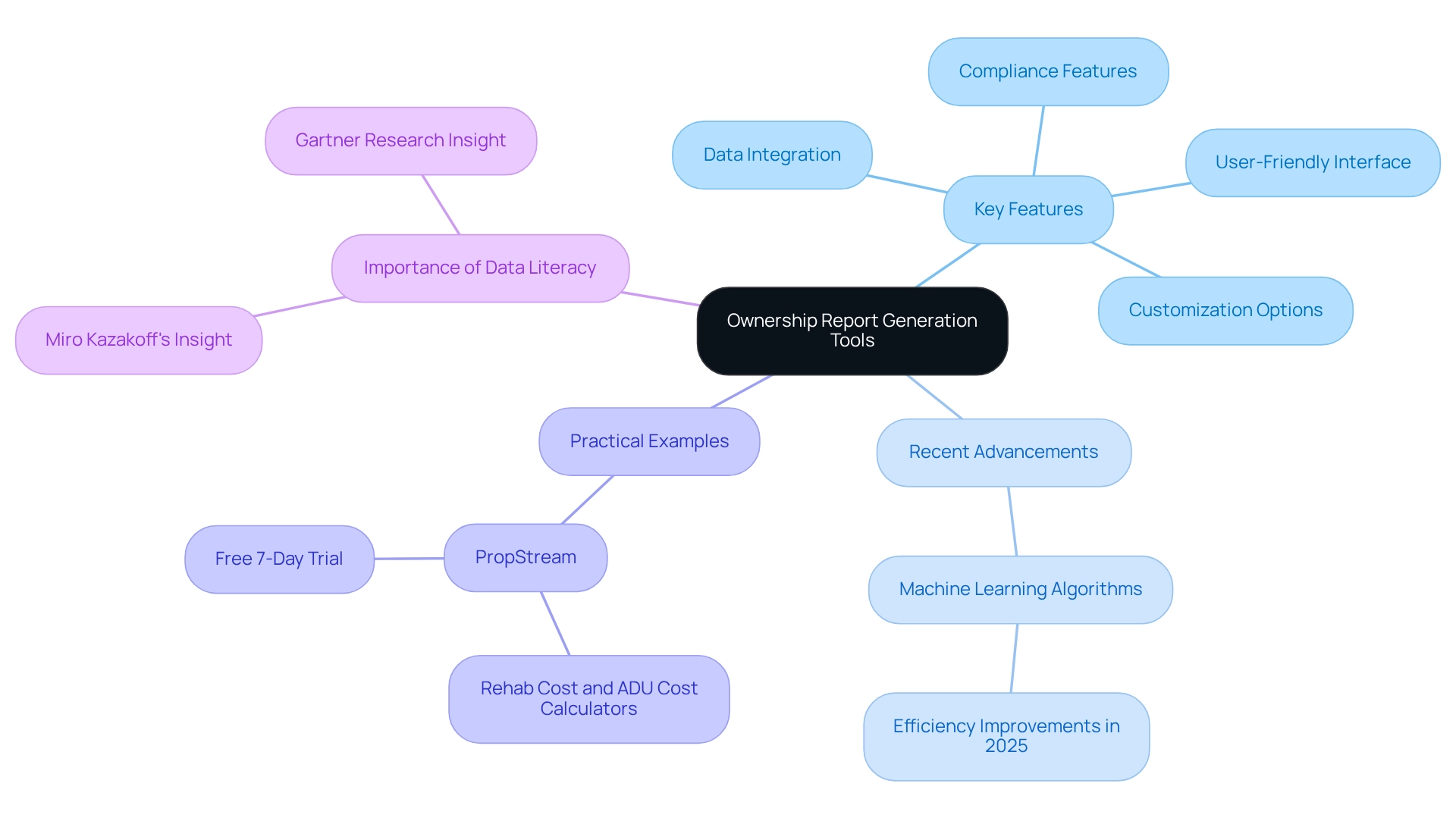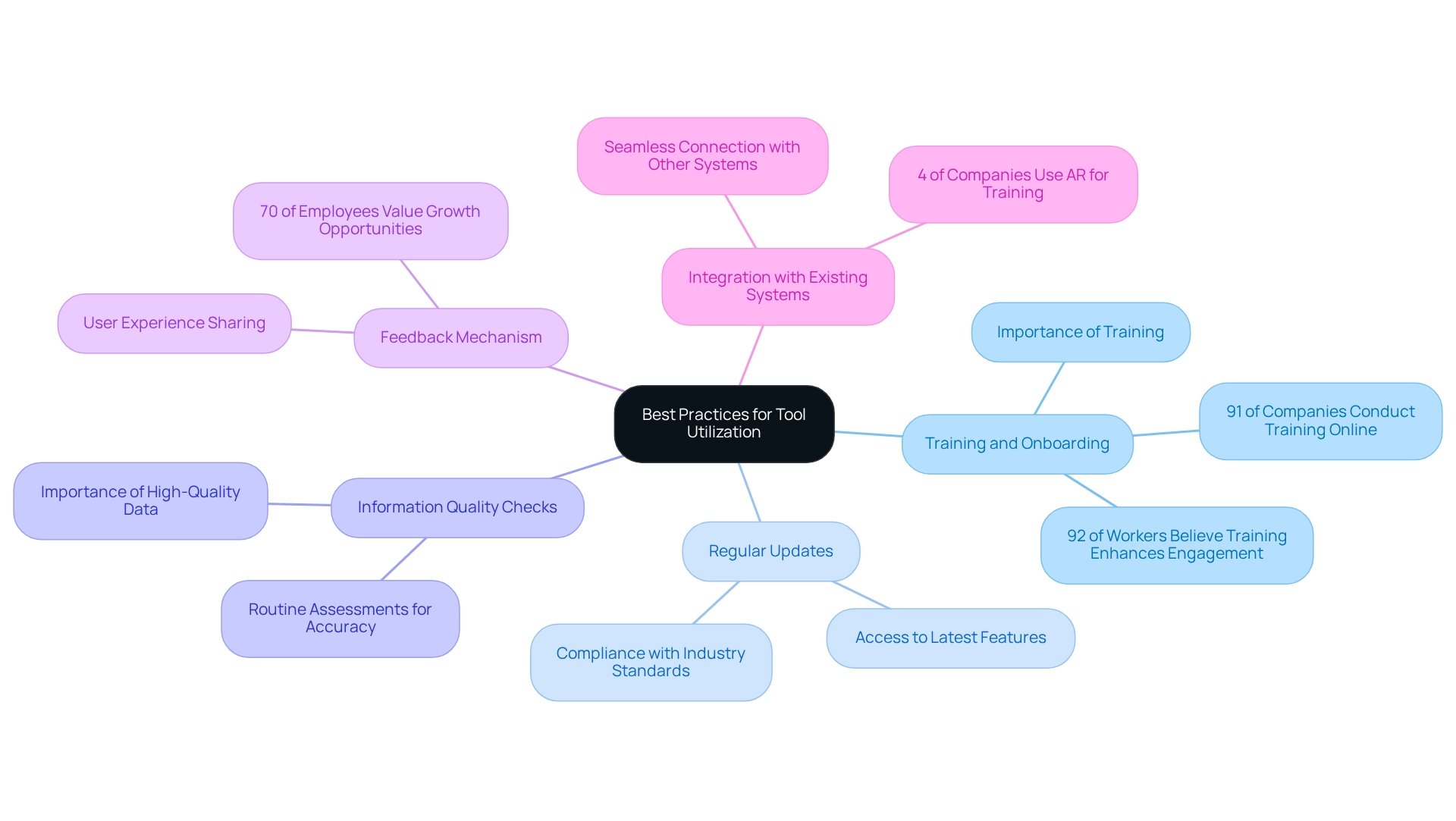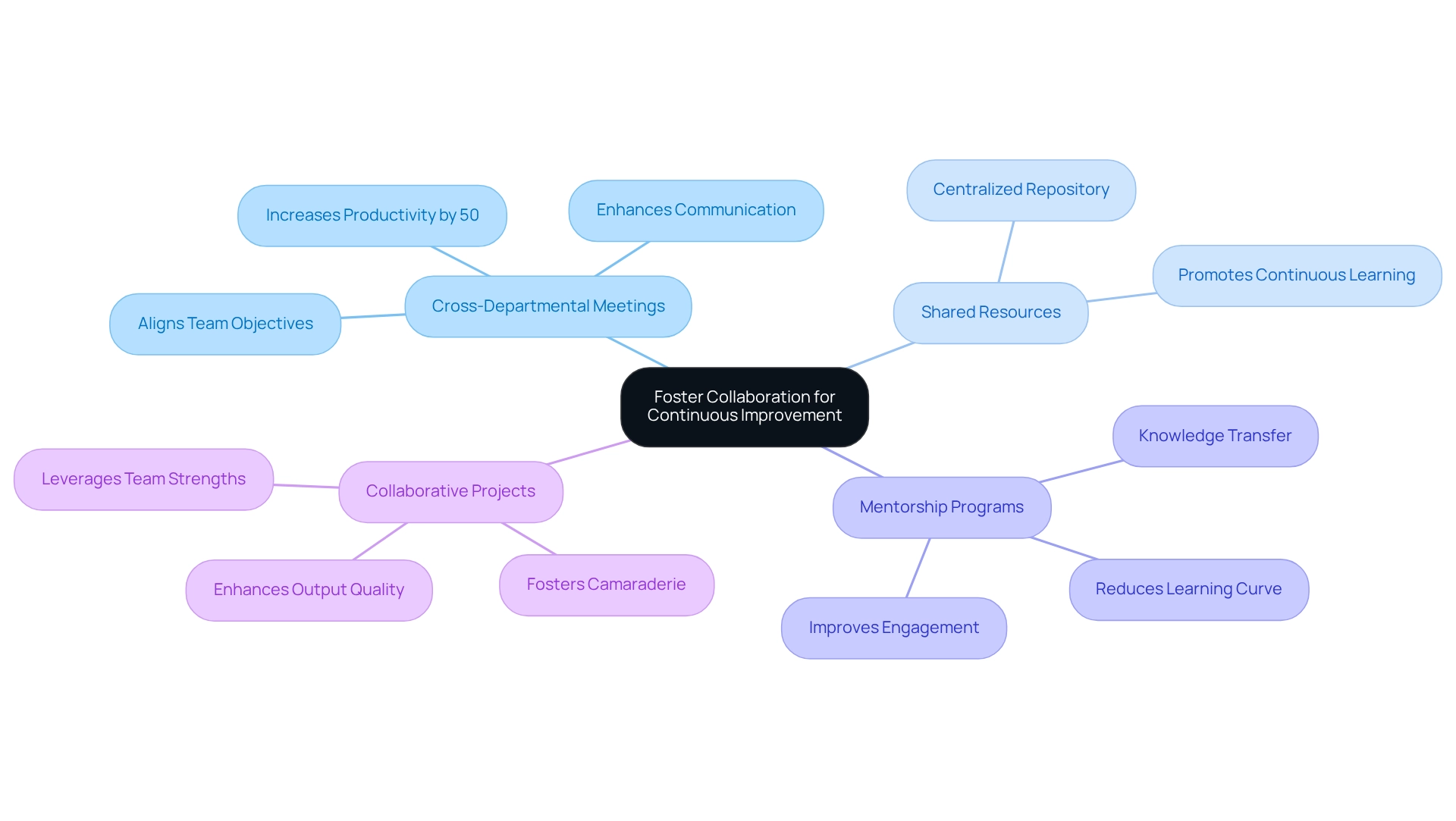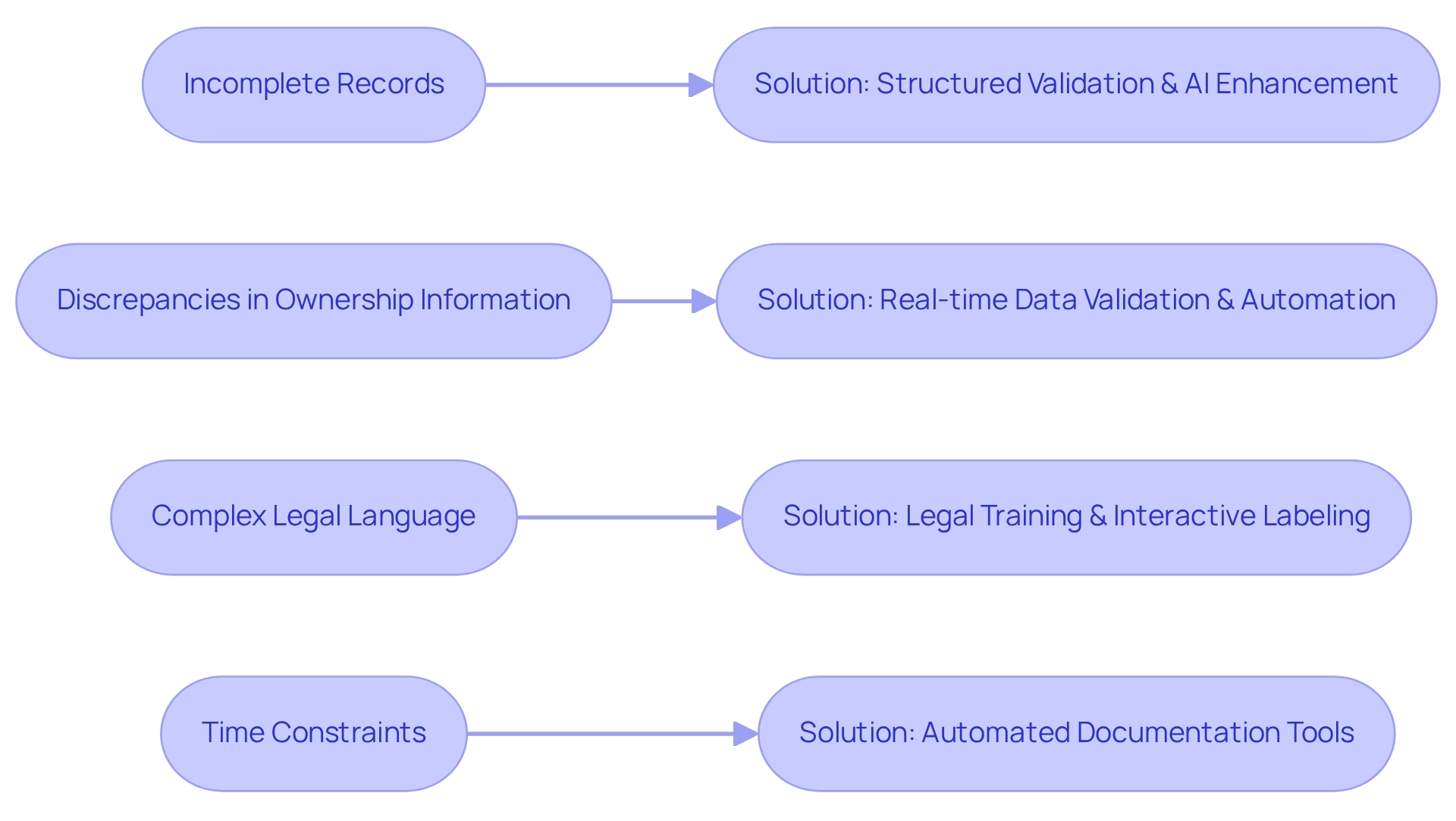Overview
The article presents five essential ownership report generation tools that significantly enhance title research by automating information extraction and ensuring compliance with legal standards. It underscores the critical nature of features such as:
- Data integration
- User-friendly interfaces
- Customization options
Furthermore, these tools are bolstered by recent technological advancements that enhance both efficiency and accuracy in property ownership documentation.
Introduction
In the intricate world of real estate, the efficiency of ownership report generation tools stands as a pivotal factor. As title researchers navigate vast amounts of data and complex legal documents, these advanced tools emerge as essential allies, streamlining the process of compiling and verifying property ownership information. Furthermore, with the integration of cutting-edge technologies such as machine learning and optical character recognition, the landscape of title research is evolving rapidly. This article delves into the key features, best practices, and collaborative strategies that empower title researchers to maximize the potential of these tools, ultimately leading to more accurate and efficient ownership reports. By addressing common challenges and implementing innovative solutions, organizations can ensure that their title research processes are not only effective but also positioned for continuous improvement in an ever-changing industry.
Understand Ownership Report Generation Tools
Ownership documentation creation resources are essential for ownership researchers, significantly enhancing the gathering and validation of property ownership details. These tools leverage advanced technologies, including machine learning and optical character recognition (OCR), to automate the extraction of information from extensive title documents. When evaluating these tools, consider the following key features:
- Data Integration: The capability to aggregate data from various sources is crucial for ensuring comprehensive coverage of ownership records, which enhances the accuracy of reports.
- User-Friendly Interface: An intuitive design facilitates easy navigation, minimizing the learning curve and allowing researchers to focus on their core tasks.
- Customization Options: The ability to adjust documents to meet is essential, as it accommodates the diverse needs of real estate professionals.
- Compliance Features: Tools that support adherence to legal standards and regulations are vital in maintaining the integrity of property transactions.
Recent advancements in ownership report generation tools have significantly enhanced efficiency in 2025, as machine learning algorithms have decreased the time needed for information processing. As noted by Gartner research, only 20% of analytics insights will deliver business outcomes through 2022, highlighting the importance of data-driven insights in the industry. Furthermore, Miro Kazakoff, a senior lecturer at MIT Sloan, emphasizes that "in a world of increased information, the companies with more information-literate individuals are the ones that are going to succeed." This underscores the necessity for organizations to prioritize data literacy in their operations.
A practical illustration of efficient ownership documentation creation resources can be observed with PropStream, which provides calculators for estimating renovation expenses and the inclusion of accessory dwelling units (ADUs). These tools enable real estate experts to swiftly assess expenses for various projects, assisting in financial planning and organization. Furthermore, PropStream currently offers a free 7-day trial for new users, providing an excellent opportunity to explore its features and capabilities. By utilizing these resources, ownership researchers can enhance both efficiency and precision with ownership report generation tools, ultimately resulting in more informed decision-making in real estate dealings.

Implement Best Practices for Tool Utilization
To maximize the effectiveness of ownership report generation tools, title researchers should adopt the following best practices:
- Training and Onboarding: Thorough instruction is crucial for all team members to fully utilize the functionalities of the resources. Effective training programs can significantly enhance user engagement. Studies indicate that 92% of workers believe workplace training positively impacts their job engagement. Furthermore, as Imed Bouchrika notes, 91% of companies conducted online, highlighting the modern shift towards accessible training solutions.
- Regular Updates: Keeping software updated is essential for accessing the latest features and security enhancements. Regular updates not only improve tool performance but also ensure compliance with evolving industry standards. Companies should assess their employees' training needs to develop effective corporate training programs, underscoring the importance of ongoing adaptation in the industry.
- Information Quality Checks: Routine assessments are vital to confirm the accuracy of processed information. Inaccuracies can lead to compliance issues, making it imperative to establish a robust quality assurance process. Data-driven decision-making is crucial for shaping effective corporate training initiatives, reinforcing the need for high-quality data in title research.
- Feedback Mechanism: Implementing a feedback system enables users to share their experiences with the performance of the resource. This feedback can guide future training initiatives and inform necessary resource enhancements, fostering a culture of continuous improvement. Notably, a Harris Poll survey revealed that 70% of employees would consider leaving their current job for a company that prioritizes employee growth and development, illustrating how feedback contributes to employee satisfaction and retention.
- Integration with Existing Systems: Ensuring that generation applications seamlessly connect with other systems, such as CRM and document management platforms, enhances workflow efficiency. This integration facilitates smoother operations and reduces the likelihood of errors. Furthermore, although merely 4% of firms presently utilize augmented reality (AR) for training, investigating creative training techniques can demonstrate a progressive strategy for incorporating ownership report generation tools with existing systems.
By following these best practices, researchers can significantly enhance their workflow efficiency and the overall quality of their documents, ultimately leading to better decision-making and improved compliance.

Foster Collaboration for Continuous Improvement
Cultivating an environment of teamwork is essential for the ongoing enhancement of ownership report generation tools. Effective collaboration within title research teams can be achieved through several strategic approaches:
- Cross-Departmental Meetings: Regularly scheduled meetings between departments such as legal, compliance, and research facilitate discussions on challenges and insights regarding resource usage. This method not only enhances communication but also aligns team objectives. Studies from Stanford University reveal that teams with strong collaboration are 50% more productive. Furthermore, with 66% of clients indicating they have transitioned to competitors due to , improving collaboration is vital for client retention.
- Shared Resources: Establishing a centralized repository for best practices, case studies, and usage tips ensures that all team members have access to valuable information. This resource serves as a foundation for continuous learning and development.
- Mentorship Programs: Pairing experienced users with newcomers promotes knowledge transfer and enhances proficiency across the team. Such initiatives can significantly reduce the learning curve and empower less experienced members to contribute effectively. Notably, groups that implement mentorship programs frequently experience improved performance and engagement among team members.
- Collaborative Projects: Encouraging teamwork on complex cases allows team members to leverage one another's strengths, ultimately enhancing the quality of the outputs produced. This strategy not only improves outcomes but also fosters a sense of camaraderie among team members. The case analysis of Parse AI illustrates how effective teamwork and ownership report generation tools can lead to substantial efficiency improvements in title research. By implementing these strategies, organizations can cultivate a cohesive environment that promotes learning and innovation in title research, ultimately resulting in more efficient and effective workflows.

Address Challenges in Title Research with Effective Solutions
Title research presents numerous challenges that can significantly impede the efficiency of ownership report generation tools. The importance of accurate title research cannot be overstated, as it lays the foundation for effective decision-making. Here are some prevalent issues along with effective solutions:
- Incomplete Records: Missing information in title documents can lead to inaccuracies. It is crucial to apply a structured method for validating and enhancing information from various sources to uphold information integrity. Parse AI's sophisticated machine learning resources accelerate document processing, facilitating faster annotation and extraction of information from unstructured documents, thereby improving the completeness of information.
- Discrepancies in Ownership Information: To mitigate errors, leverage tools that provide real-time data validation, allowing for cross-checking ownership details against public records. Parse AI's research automation capabilities extract critical information from document records, enhancing the reliability of the information and supporting compliance with regulatory requirements, such as those highlighted by trade date accounting.
- Complex Legal Language: Researchers often struggle with intricate legal terminology. Providing training on legal language and document interpretation equips title researchers with the necessary skills to navigate more effectively. Additionally, Parse AI's interactive labeling features assist in clarifying legal terms during the document review process.
- Time Constraints: The pressure of tight deadlines can compromise the quality of research. Employing automated documentation tools, like those offered by Parse AI, can accelerate the compilation and creation of materials, allowing researchers to focus on analysis instead of input.
As Alexei Maxim Russell expressed, "It is my sincere desire that my research and hard work will help create a world where we all learn to walk this Earth, safe, enlightened and free from the perils of cruelty, ignorance, and all the other dark and sinister forces …" This sentiment underscores the significance of high-quality information in ensuring effective decision-making. By proactively addressing these challenges with Parse AI's innovative solutions, title researchers can significantly enhance their workflows, ensuring the delivery of accurate and comprehensive ownership report generation tools. Prioritizing information quality management is essential, as incomplete records can undermine positions in legal disputes and obstruct effective decision-making. Furthermore, the case study titled "Data Quality as a Performance Issue in Organizations" emphasizes that ensuring high-quality data is vital for effective decision-making and that organizations must prioritize data quality management to improve their overall performance.

Conclusion
The evolution of ownership report generation tools is transforming title research by enhancing efficiency and accuracy in compiling property information. By leveraging technologies such as machine learning and optical character recognition, these tools facilitate streamlined data extraction and ensure compliance with legal standards. Key features, including data integration and user-friendly interfaces, empower title researchers to generate reliable ownership reports, thereby facilitating informed real estate decisions.
Maximizing the effectiveness of these tools necessitates the implementation of best practices, which include:
- Comprehensive training
- Regular updates
- Rigorous data quality checks
Such measures equip researchers to adeptly navigate the complexities of title research. Furthermore, fostering a feedback mechanism and integrating tools with existing systems can significantly enhance workflow efficiency.
Collaboration within research teams is imperative for continuous improvement. Encouraging cross-departmental meetings and establishing mentorship programs not only fosters innovation but also strengthens team dynamics, ultimately leading to increased productivity and client satisfaction.
Addressing common challenges in title research with effective solutions is crucial for maintaining the integrity of ownership reports. By leveraging advanced tools for data validation and simplifying complex legal terminology, inaccuracies can be mitigated, and processes streamlined. As the demand for accurate property information escalates, prioritizing data quality and embracing innovative solutions will be vital for success in the evolving real estate industry. Ultimately, the strategic integration of technology and best practices will enhance operational efficiency and lay the groundwork for sustained success.
Frequently Asked Questions
What are ownership documentation creation resources?
Ownership documentation creation resources are tools designed for ownership researchers that enhance the gathering and validation of property ownership details, utilizing advanced technologies like machine learning and optical character recognition (OCR) to automate information extraction from title documents.
What key features should be considered when evaluating these tools?
Key features to consider include data integration, user-friendly interface, customization options, and compliance features, which collectively ensure comprehensive coverage, ease of use, adaptability to client needs, and adherence to legal standards.
How have recent advancements in ownership report generation tools improved efficiency?
Recent advancements, particularly in 2025, have leveraged machine learning algorithms to significantly reduce the time required for information processing, thereby enhancing overall efficiency in generating ownership reports.
What does Gartner research indicate about analytics insights?
Gartner research highlights that only 20% of analytics insights will deliver business outcomes through 2022, emphasizing the importance of data-driven insights in the industry.
Why is data literacy important for organizations?
Data literacy is crucial because, as noted by Miro Kazakoff from MIT Sloan, organizations with more information-literate individuals are more likely to succeed in a world with increased information.
Can you provide an example of an efficient ownership documentation creation resource?
An example is PropStream, which offers calculators for estimating renovation expenses and assessing accessory dwelling units (ADUs), aiding real estate experts in financial planning and organization.
Is there an opportunity to try PropStream before committing?
Yes, PropStream currently offers a free 7-day trial for new users, allowing them to explore its features and capabilities without any initial commitment.
How do these resources benefit ownership researchers?
These resources enhance both efficiency and precision in ownership report generation, ultimately leading to more informed decision-making in real estate dealings.




